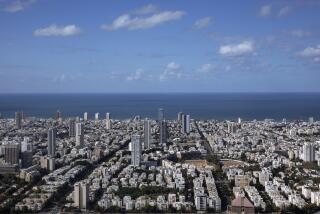MIDDLE EAST : Mubarak Tries to Muzzle Egypt Press--but He May Get Bitten
- Share via
CAIRO — Egyptian President Hosni Mubarak is under furious political attack, even by longtime supporters, after a blunt attempt to silence Egypt’s rambunctious opposition newspapers.
On May 27, Mubarak’s government pushed changes in the national press law through Parliament with only two hours of debate. The revisions provide for imprisonment of at least five years for the publication of “false or biased rumors, news and statements or disconcerting propaganda . . . if it offends social peace, arouses panic amongst the people, harms public interest or shows contempt for the state institutions or officials.”
The new law prompted a predictable outcry from the opposition press--whose headlines included “An Assassination of Press Freedom” and “Farewell to Democracy in Egypt”--as well as from human rights groups, civil liberties lawyers and even Egyptian filmmakers.
But most significantly, the protest has been joined by editors, columnists and reporters for the country’s official, government-owned newspapers, where the top editors are appointed by Mubarak and which are known for their sugary coverage of his every public appearance and utterance.
After initially ignoring the new law, the official press has grown more critical. At a meeting last Saturday of the Egyptian Press Syndicate attended by more than half the group’s estimated 1,800 members, the pro-government newspapers agreed to join the opposition press in a one-day shutdown next Saturday unless the government repeals the law.
*
Saad Eddin Ibrahim, a distinguished sociologist and commentator, believes the Mubarak government badly miscalculated in passing the law.
“It was either insensitivity, clumsiness or utter stupidity--or a combination of all three,” he said in an interview.
Even before adoption of the new law, Egyptian newspapers did not enjoy freedoms typical in North America or Europe. In addition to owning the large, mass-circulation newspapers, the government licenses the alternative press, which mainly consists of mouthpieces for the weak opposition parties in Parliament. Authorities periodically summon opposition paper editors for questioning by police, and last December, one of them, Adel Hussein, 62, was held for 25 days, most of the time in a 6-foot-by-8-foot cell furnished only with a toilet and one blanket.
Despite these restraints, the Mubarak government has until now tolerated media criticism of its policies beyond what is permitted in almost any other Arab country. “The opposition has enjoyed freedoms never seen before in this country, ever,” said Mohammed Sid Ahmed, a leading columnist of the semiofficial newspaper Al Ahram and a critic of the new law.
*
The opposition press may have stretched the government’s forbearance beyond the limit, however, with stories alleging corruption in the Mubarak administration. The new law increases penalties for “slandering” public servants.
Columnist Ahmed said the revised law is an obvious attempt to place “the journalist, rather than those accused of corruption, on the defensive. . . . Every journalist will feel intimidated.”
The new law does not apply to television in Egypt, which already is monopolized by the state and eschews critical news coverage or anti-government commentary. The government has also said it will not enforce the law against reporters in Egypt who work for foreign publications.
Ibrahim said the media crackdown--along with similar efforts to silence nonviolent opposition among lawyers and other professionals, human rights groups and social service organizations--risks alienating middle-class intellectuals who have unflinchingly supported the government in its three-year battle against armed Islamic insurgents.
“The intelligentsia thinks that the state is turning its back on them,” he said.
Amid this storm, there are signs that Mubarak may be looking for a graceful retreat. He recently said that if journalists follow a voluntary code of ethics, the new law will “go to sleep.”
The opposition paper Al Shaab (The People) had this headline in reply, “Mr. President: Laws Don’t Sleep and Neither Will We.”
More to Read
Sign up for Essential California
The most important California stories and recommendations in your inbox every morning.
You may occasionally receive promotional content from the Los Angeles Times.










